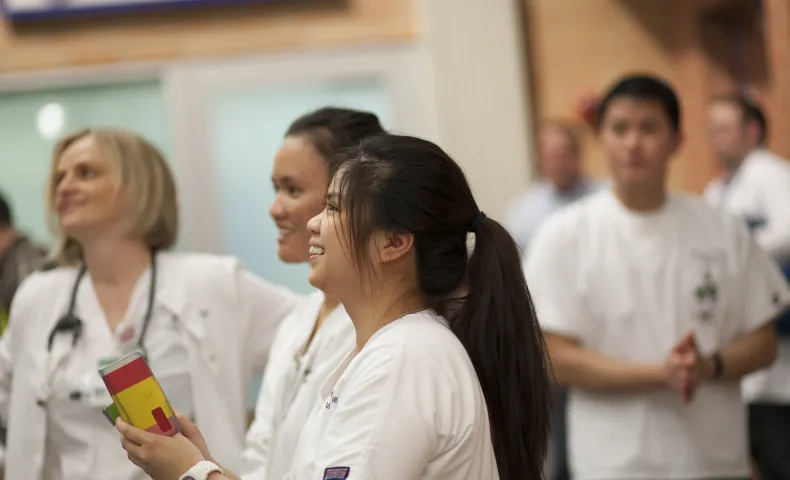 Photo by Flickr user COD Newsroom
Photo by Flickr user COD Newsroom
Reflections on a Hospital Stay
As the immigration debate rages on in Washington, it is easy to forget what's really at stake. We watch the talking heads make their tit-for-tat arguments about border security and pathways to citizenship, and meanwhile we lose sight of the larger story — the story of what immigrants do for this country, and how they make us better and stronger as a nation.
I was reminded of this when I had to be in the hospital for a week recently after an emergency surgery. It was a horrible experience that I hope not to repeat any time soon — getting poked and prodded all the time, being woken up constantly, and desperately missing my family and friends and daily routines.
But the one bright spot was watching a remarkably diverse team of people in the hospital — doctors, nurses and others -- working side-by-side to save lives and help their patients heal. As someone who works on immigrant rights issues, it was inspiring to connect in such a personal way to people who had settled in the United States from all over the world.
My surgeon was Nigerian; he very literally saved my life. My nurses came from so many countries that it was like being in the halls of the U.N. The Philippines, China, Korea, Vietnam, Belize, Kenya, Sierra Leone, Indonesia. With every shift change, I felt like I was dropped into a different nation — everyone had different accents and new stories to share about coming to America from a faraway place.
And then there was Alita. A certified nursing assistant, Alita is from Indonesia. As I got to know her during the week, I learned how tough Alita had it growing up. A very poor family. An irresponsible father kicked out of the house by Alita's mother in a fit of rage. Her father becoming destitute and homeless. Her family barely scraping by.
At age 20, Alita was put on a plane from Jakarta to San Francisco by her mother during a time when our immigration policies were more generous. Alita used the word "penniless" over and over to describe how she arrived in this country. She had a small bag with all of her belongings in it, and a piece of paper printed with one word: "Exit." She studied the word again and again on the long plane ride across the Pacific, knowing that if she followed the signs with that word on them, she would be able to get out of the airport and find her new life.
When her plane landed in San Francisco in the late 1980s, Alita arrived in a country that was willing to give her a fair shot. She married a good man, an Indonesian mechanic, and they had a son and a daughter. While she was raising her children, Alita began to go to school at night to get her credential to be a certified nursing assistant. Alita has now worked at the hospital for nearly 12 years. She and her husband eventually bought a house in the East Bay. Alita said she and her husband have lived frugally and saved every penny for their children's futures.
This fall, Alita drove her son to Stanford University, where he started as a freshman. She described him as "nerdy." He wants to design fuel-efficient cars and planes. She drove home after dropping him off at his dorm and her eyes welled up with tears both because she missed him already and because she knew she finally realized her American dream.
As Alita told me all of this during our time together, I was struck by the realization that there are countless other Alitas out there in America today. People who have come to this country to do things that were not possible in the countries where they were born: get an education, make an honest living, raise a family, help their children succeed.
It also struck me that Alita is exactly why we do the work of trying to make America more welcoming of immigrants. My week in the hospital was painful and hard in many ways. But I directly experienced the incredible contributions that immigrants are making to our society every day, and it made me more determined than ever to keep working for change.
This piece was originally published on the Huffington Post on 11/9/2014.
